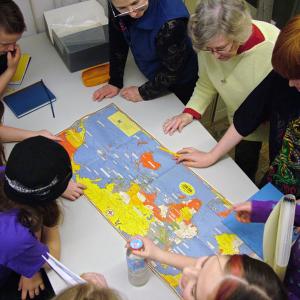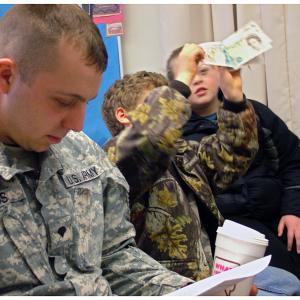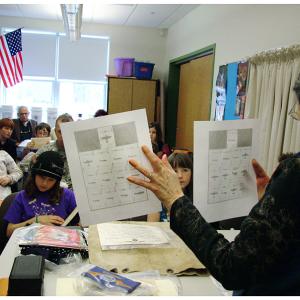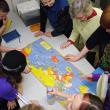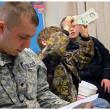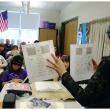Ask grandma about the sugar in the baby carriage
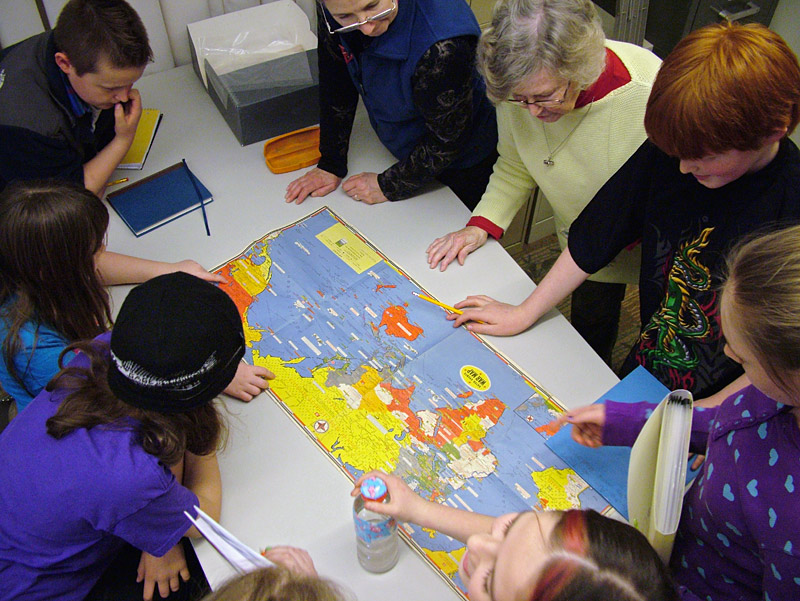 Students from the Captain Albert School in Belfast crowd around a geopolitical map of World War II after a presentation by Belfast Historical Society & Museum Director Megan Pinette, top, center. Meg Hunter, next to Pinette, recalled being a young girl in London during German air raids. (Photo by Ethan Andrews)
Students from the Captain Albert School in Belfast crowd around a geopolitical map of World War II after a presentation by Belfast Historical Society & Museum Director Megan Pinette, top, center. Meg Hunter, next to Pinette, recalled being a young girl in London during German air raids. (Photo by Ethan Andrews)
 Justin Gibbs of Stockton Springs, left, a veteran of the Iraq War brought his grandfather's WWII uniform to the presentation at Captain Albert Stevens School. Behind Gibbs, students inspect a stack of old European and British currency. (Photo by Ethan Andrews)
Justin Gibbs of Stockton Springs, left, a veteran of the Iraq War brought his grandfather's WWII uniform to the presentation at Captain Albert Stevens School. Behind Gibbs, students inspect a stack of old European and British currency. (Photo by Ethan Andrews)
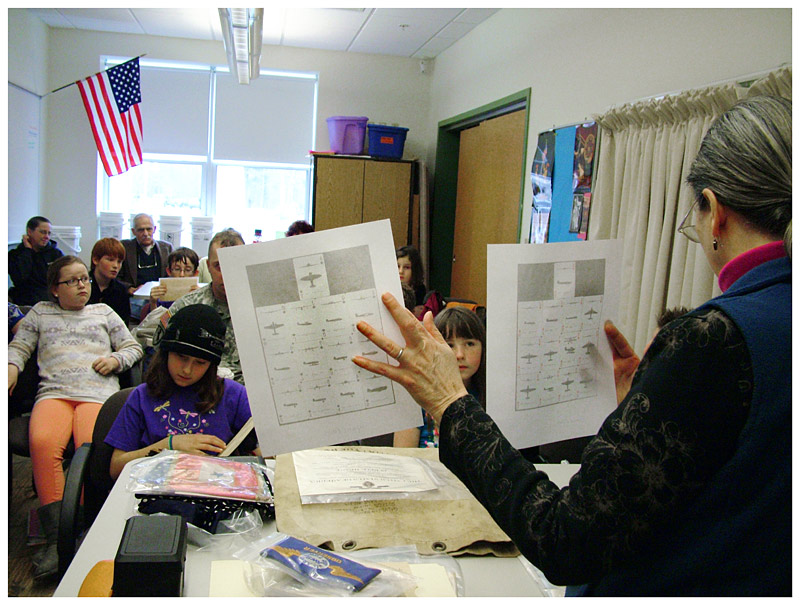 Megan Pinette, director of the Belfast Historical Society & Museum shows reproductions of WWII-era charts designed to help civilians identify military airplanes. (Photo by Ethan Andrews)
Megan Pinette, director of the Belfast Historical Society & Museum shows reproductions of WWII-era charts designed to help civilians identify military airplanes. (Photo by Ethan Andrews)
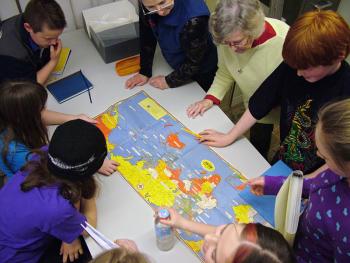 Students from the Captain Albert School in Belfast crowd around a geopolitical map of World War II after a presentation by Belfast Historical Society & Museum Director Megan Pinette, top, center. Meg Hunter, next to Pinette, recalled being a young girl in London during German air raids. (Photo by Ethan Andrews)
Students from the Captain Albert School in Belfast crowd around a geopolitical map of World War II after a presentation by Belfast Historical Society & Museum Director Megan Pinette, top, center. Meg Hunter, next to Pinette, recalled being a young girl in London during German air raids. (Photo by Ethan Andrews)
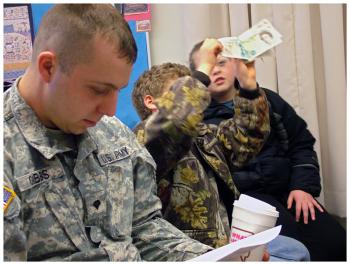 Justin Gibbs of Stockton Springs, left, a veteran of the Iraq War brought his grandfather's WWII uniform to the presentation at Captain Albert Stevens School. Behind Gibbs, students inspect a stack of old European and British currency. (Photo by Ethan Andrews)
Justin Gibbs of Stockton Springs, left, a veteran of the Iraq War brought his grandfather's WWII uniform to the presentation at Captain Albert Stevens School. Behind Gibbs, students inspect a stack of old European and British currency. (Photo by Ethan Andrews)
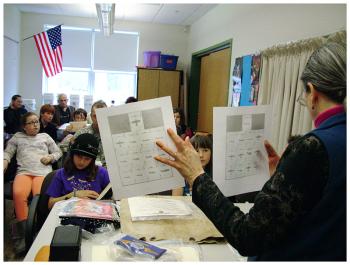 Megan Pinette, director of the Belfast Historical Society & Museum shows reproductions of WWII-era charts designed to help civilians identify military airplanes. (Photo by Ethan Andrews)
Megan Pinette, director of the Belfast Historical Society & Museum shows reproductions of WWII-era charts designed to help civilians identify military airplanes. (Photo by Ethan Andrews)
BELFAST - What was life like during World War II, and how was it different than life during today's wars?
That was the big question posed to fifth graders from the Extended Learning program at three RSU 20 elementary schools. Starting last fall, they read five books set against the backdrop of the war, then interviewed community members who recalled the war years. In documenting what they learned, the students were asked to compare the sacrifices made during World War II to those being made during the current war.
It's safe to say that U.S. history looks kindly on World War II as a time of noble sacrifice. The awareness of the war was woven into citizens' daily lives as communities around the country collected scrap metal, rubber and other materials for the military, submitted to government rationing of food and gasoline, and planted Victory Gardens.
Belfast was no exception, according Megan Pinette and George Squibb of the Belfast Historical Society & Museum, who spoke to the group recently on life in Belfast during the war. Clippings from The Republican Journal supported the idea that the war was ever present in civilian life. Public service notices challenged residents with obscure volunteer jobs like collecting milkweed floss for floatation in life preservers. Ads highlighted foods and commodities that could be bought without ration stamps, and the war effort was used as a selling point in some cases.
A bike shop in Camden addressed gas rationing with an ad that read: "Got a bike? It's patriotic."
There were also details that were unique to the Midcoast.
The poultry processing industry that would define downtown Belfast for much of the second half of the 20th Century came about in response to a shortage of beef during the war.
Victory Gardens, which were novel in other parts of the country, weren't big in Maine.
"People always had gardens," Pinette said.
National Guard Company K mustered in the old Opera House, holding target practice in the attic, and performing drills in the large hall. A cupola that once stood on the roof of the old Republican Journal building (northeast corner of Main and High Streets) was manned 24-hours a day as a look out. There were reports of German U-Boats in Penobscot Bay, and residents were practiced in identifying different types of military aircraft.
After the war, a salt water pool was built in City Park as a war memorial. The pool has since been replaced by a parking lot and horseshoe pits. Pinette asked the group if a swimming pool was strange kind of memorial. No one volunteered a strong opinion. Things were clearly different then.
Following are excerpts from several students' reports on their WWII interviews:
Interview of Sam Thompson by Katie Ritchie
[Thompson is 88 years old and served at total of 21 years in the Navy and Air Force in both WWII and the Korean War.]
He learned about the war one evening after his mother went to bed. He and his father were listening to the radio. The police cut the station short and said "Pearl Harbor has been bombed!" of course they had no idea where in the world Pearl Harbor was. They got out an atlas and found Pearl Harbor in Hawaii.
When he was 17, he signed up for the Navy. Many people enlisted for the war so he had to wait about 3 months to be stationed. He went into the Navy in October of 1942 as an aircraft mechanic. He was stationed [as a mechanic] on a training aircraft carrier that was 570 feet long. It was called the USS Wolverine. Some of the training pilots would miss the ship completely and fall in the lakes.
[When the lake froze, Thompson was transferred to Seattle where he trained as a parachute rigger, then went to gunnery school and was later transferred to a Naval Air Station in Attu Alaska.]
Sam talked about some of his combat experiences. He talked about being a gunner on a plane that had attached northern Japan. The plane had been hit and had many bullet holes in it. The navigator was shot. They crash landed in the ocean and were able to get out of the plane before it sank.
Interview of Elsie Benner by (her granddaughter) Skylee Middleton
World War 2 was very different than the world today. For instance, during the war, you had coupons (for sugar, gas, metal, etc. ). You were required to ration these things. Once a month you got new coupons and your amount depended on your career.
When Elsie found out Pearl Harbor was bombed, she was very young and scared. I would be very afraid too.
Something else Elsie will never forget is at night when you went into blackout. During blackout, you had to make sure no light was shining outside the house. She lived on the beach in Bar Harbor, so every hour, on the hour, patrol soldiers would drive along the beach in a jeep watching the water for any Japanese soldiers.
Interview of James Coyne by Luke Hamlin
I did my interview with a man named James (Jim) Coyne. He is 99 and is turning 100 years old on April 1st. He was born in 1913 and was a counter intelligence officer - A.K.A a person who spied on the spies during World War 2!
Before Jim enlisted, his life as a kid was pretty cool, from my point of view, because he played tennis, football and he like to go hunting. [...] James was on his high school football team, which never lost a game and was never scored against. The players wore leather helmets and no pads at all. After high school Jim did numerous things such as working at an ammunition factory where they made 55mm shells for cannons. Then later on he worked at a TNT factory to make explosives. He also went to law school and passed the bar exam in Massachusetts.
[Coyne enlisted in 1941 and trained at Fort Benning, Georgia. Pearl Harbor was bombed that year and Coyne was subsequently stationed in Hawaii]
Believe it or not, Jim was standing on a golf course the second that we were bombed by Japan.
When Jim's group of men set out on a boat [from Hawaii] to attack Japan, two Atomic bombs hit Japan from America at the same time that Jim was on the boat. This caused Jim and his other men to turn arond as they were sent back to Hawaii for safety. When he found out that Japan surrendered, a few months later he left the Army and went back into civilian life.
[After Japan surrendered, Coyne found a piece of a Japanese "Zero" plane that he lent to Hamlin to share with the class.]
Jim also remembered some of the necessities that the army was asking for during wartime, like butter and gasoline. They needed butter for food and gasoline to power planes, boats and automobiles. Jim told me that during the war some things did change, like people had less of what they wanted like sugar aand butter, and a lot of women started working because so many men were at war.
I really enjoyed interviewing Jim because he taught me a lot about what it was like to live during World War 2 and he was a really nice man.
Interview with Maureen and Don Groening by (their grandson) Daniel Groening
[Don and Maureen were 6 and 7 years old respectively when the war started. He lived in New York City; she lived on Long Island]
Grandpa remembers a neighbor who had several sons in the war and one died in the war and his mother became a gold star mother, which meant one of the stars hanging on a small banner in her front window became gold meaning that he had died. All the neighbors including Grandpa, were very sad becasue they all knew him.
[Like many of those interviewed for this project, the Groenings remembered certain foods being scarce.]
Grandma recalls rushing down to the supermarket for her mother when she heard tha they had some of those things in the store. All those things were needed by the soldiers in the war. She said her mother sent her to the store with the baby carrieage to fill it up with as much sugar as she was allowed to buy. Grandma's brothers and sisters weren't in the carriage at the time, though!
Grandma told me her cousin was a war hero. His plane crashed in the ocean and he got a life raft and went back to save the two other men that were in the plane that was sinking. She also remembers that when the war ended, kids decorated their bikes in red, white and blue and they blew horns to celebrate that the war was over.
The WWII project is currently in its third year at Ames (Searsmont), Captain Albert Stevens (Belfast) and Edna Drinkwater (Northport) elementary schools. Interview subjects in past years have ranged from relatives and family friends to strangers approached in the airport.
Ethan Andrews can be reached at news@penbaypilot.com
Event Date
Address
United States

